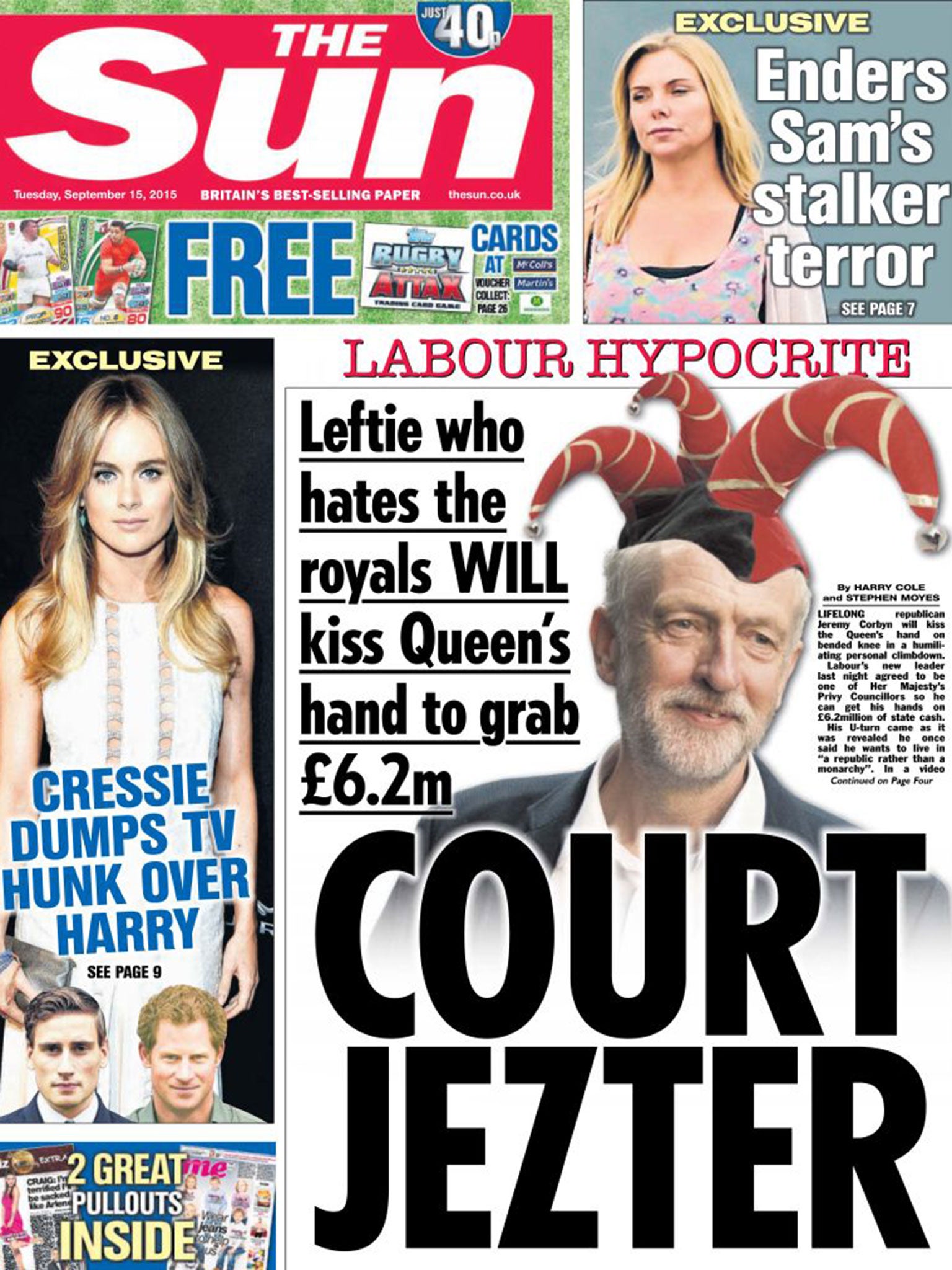The Sun told to put apology to Jeremy Corbyn on front page
Exclusive: New press standards watchdog shows its teeth over tabloid slur

Your support helps us to tell the story
From reproductive rights to climate change to Big Tech, The Independent is on the ground when the story is developing. Whether it's investigating the financials of Elon Musk's pro-Trump PAC or producing our latest documentary, 'The A Word', which shines a light on the American women fighting for reproductive rights, we know how important it is to parse out the facts from the messaging.
At such a critical moment in US history, we need reporters on the ground. Your donation allows us to keep sending journalists to speak to both sides of the story.
The Independent is trusted by Americans across the entire political spectrum. And unlike many other quality news outlets, we choose not to lock Americans out of our reporting and analysis with paywalls. We believe quality journalism should be available to everyone, paid for by those who can afford it.
Your support makes all the difference.Jeremy Corbyn has been handed a major victory over Britain’s leading tabloid, after The Sun was ordered to publish a front page correction for a story which falsely claimed the Labour leader only agreed to be initiated as a Privy Councillor because his party stood to gain financially.
The judgement is unusual because critics have accused the recently created Independent Press Standards Organisation (Ipso) of being too feeble to enforce its authority on powerful newspaper firms.
The complaint was made not by Mr Corbyn but a member of the public – a former journalist called Rosie Brocklehurst who worked in the Labour Party press office in the mid-1980s.

She objected to a story that published on the front page story of The Sun on 15 September, when there was speculation about whether the recently elected Labour leader would go through the arcane ritual of becoming a privy councillor.
Under the headline – “Labour hypocrite: Leftie who hates the Royals WILL kiss Queen’s hand to grab £6.2m” – the article said, correctly, that Mr Corbyn had decided to join the Privy Council. But it falsely alleged that his sole motive was to secure state funding for the Labour Party.
Under legislation passed 40 years ago, all opposition parties are entitled to what is known as ‘short money’ to pay the salaries of researchers and other aides. The money is allocated according to a fixed formula, which does not depend on whether the party leader is a privy councillor.
The leader of the opposition also receives an extra grant of more than £700,000 to cover office expenses.
When challenged over the 15 September article, The Sun argued that the grant to the leader’s office might be withheld if the leader refused to join the Privy Council – something which has never happened since state funding of opposition parties began. Ipso found the claim was not true. The IPSO Complaints Committee ruled that “it was significantly misleading to claim, as fact, that Labour’s access to Short money (either the £6.2m, or the £777,538.48) was conditional on Mr Corbyn’s joining the Privy Council; the two were not directly connected.”
Ipso was established 15 months ago, after the Leveson Inquiry into press standards, as a replacement for the Press Complaints Commission (PCC), which was controlled by the newspaper industry and was criticised for failing to deal with phone hacking.
“IPSO is an improvement on the PCC if only because they have courteous complaints officers whose aim is to try to mediate a satisfactory conclusion for both parties,” Rose Brocklehurst said. “In this case, the mediation failed because I became even more determined when the Sun were rude to me while I extended all courtesy to them in correspondence. The front page story was in my view completely spurious, nasty and wrong. My whole IPSO experience showed that an individual needs determination and courage to enter the complaints process.” IPSO is currently investigating more than 2,600 complaints about a separate Sun front page last month claiming that one in five British Muslims are sympathetic to jihadis.
Mr Corbyn reiterated his calls for a break-up of big media corporations on 21 December. “What I don’t get is the way in which the media, particularly the print media, can be routinely abusive and feel that that is perfectly OK,” he told the Huffington Post.
“I think there does need to be multiplicity of ownership. There does need to be a wide variety of it, and no crossover between broadcast and print media.”
Election emails
The Daily Telegraph newspaper has been fined £30,000 by the Information Commissioner’s Office after it sent hundreds of thousands of emails on the day of the general election urging readers to vote Conservative.
The ICO found that Telegraph Media Group broke direct marketing rules when it issued the letter from Chris Evans, Daily Telegraph editor, which was attached to the paper’s morning ebulletin.
The ICO found that none of the subscribers had given specific consent to receive that kind of marketing, a requirement under the Privacy and Electronic Communications Regulations.
Subscribe to Independent Premium to bookmark this article
Want to bookmark your favourite articles and stories to read or reference later? Start your Independent Premium subscription today.
Join our commenting forum
Join thought-provoking conversations, follow other Independent readers and see their replies
Comments